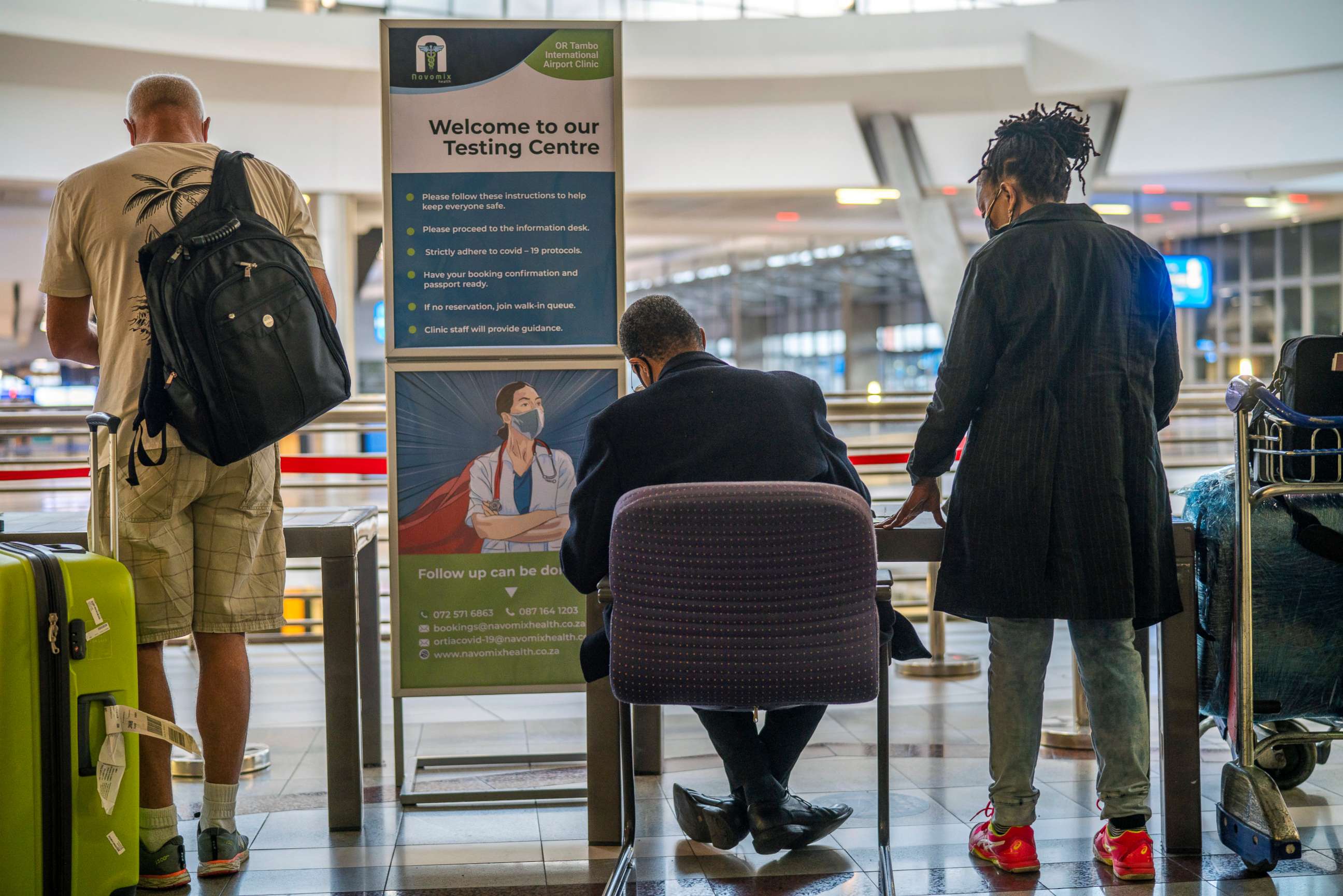What to know about new COVID-19 variant omicron
"It's something that, in real time, we're learning more and more about."
Global health authorities said they're monitoring a new COVID-19 variant first identified in southern Africa, with the World Health Organization saying Friday the new strain, called omicron, is a variant of concern.
On Monday, the WHO said the overall global risk is assessed as "very high" due to the variant's mutations although there are still many unknowns.
The WHO urged countries to step up monitoring and surveillance. The global health agency said it's still not clear whether the variant is more transmissible or causes more serious illness, or if it affects vaccines. Such studies will take time.
The first confirmed case in the U.S. was identified in California on Wednesday in a vaccinated individual, but the person's symptoms were mild, the U.S. Centers for Disease Control and Prevention said. The person had traveled to South Africa in late November.

"As all of you know -- because we've been discussing this -- we knew that it was just a matter of time before the first case of omicron would be detected in the United States," Dr. Anthony Fauci, the White House's chief medical adviser, said Wednesday.
As of Wednesday, there were more than 370 confirmed cases in nearly 30 countries across the globe, with most in South Africa but seven cases in Canada and a few dozen in the U.K.
"We don't know very much about this yet," Dr. Maria Van Kerkhove, the WHO's COVID-19 technical lead, said Nov. 25. But concern about this variant stems from its "large number of mutations," Kerkhove added, which could "have an impact on how the virus behaves."
Concerns about this variant already have prompted several countries, including the U.S., to impose travel restrictions from countries in southern Africa. The WHO is urging calm, saying it's premature to close borders.
There are thousands of COVID-19 variants, with new ones emerging all the time. Usually new variants disappear quickly because they're overrun by a more dominant strain.
The now-dominant delta variant is so highly transmissible that most of the new variants that have cropped up in recent months have been unable to gain a foothold. In the United States, the delta variant comprises an estimated 99.9% of all new cases.
"There's obviously this tension between crying wolf and exacerbating concerns about the variants, but also being caught flat-footed and not responding swiftly enough," said Dr. John Brownstein, chief innovation office at Boston Children's Hospital and an ABC News contributor. "This is where we have to cautiously respond without inciting panic, because this could easily turn out to be a variant similar to others that have never really panned out to be global concerns."
Scientists across the globe constantly monitor all newly emerged variants to see if they're spreading in a meaningful way and global health authorities have said they're monitoring this new variant closely.

Vaccine companies, meanwhile, are making plans to tweak vaccines to address new variants if it becomes necessary.
Current COVID-19 vaccines, which rely on genetic technology, could be easily updated to better combat emerging variants -- though so far that hasn't been necessary.
Pfizer/BioNtech said that if a "vaccine-escape variant emerges," it expects "to be able to develop and produce a tailor-made vaccine against that variant in approximately 100 days, subject to regulatory approval."
Moderna also said it is "rapidly advancing" an omicron-specific variant, while Johnson & Johnson also said it will move forward with an omicron-specific vaccine as needed.
Nine variants are currently being monitored by the WHO, which designates particularly worrisome strains as variants of "interest" or "concern." When they no longer pose a significant public health threat, the variants are reclassified -- so far during the pandemic, 13 have been removed from the WHO's list.
But public health experts said the emergence of variants underscores the urgent need to vaccinate everyone on the planet.
"It gives us a lens into why as epidemiologists we've been so concerned about global vaccine equity," Brownstein added. "It's a recognition that with not enough people around the globe immunized, it creates more opportunities for variants to emerge, and this is a very good example of that."
ABC News' Guy Davies, Josh Hoyos, Aicha El Hammar, Zoe Chevalier, Liezl Thom and Zoe Magee contributed to this report.




